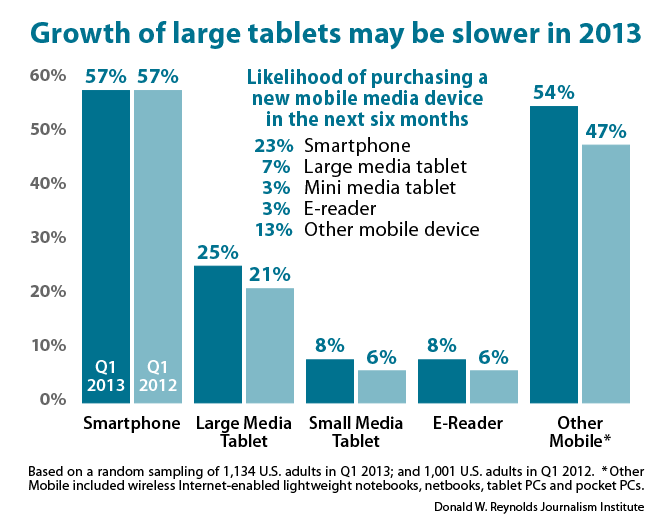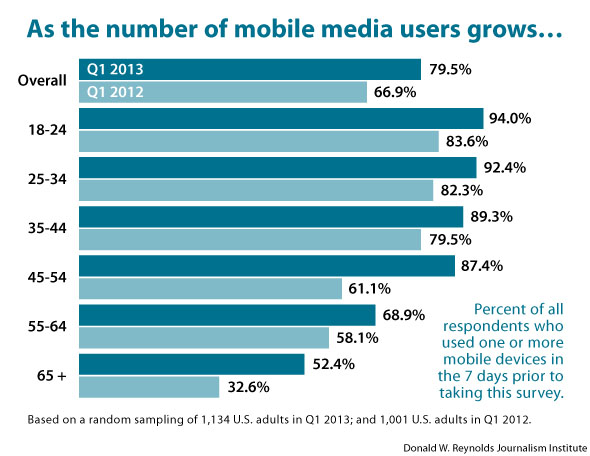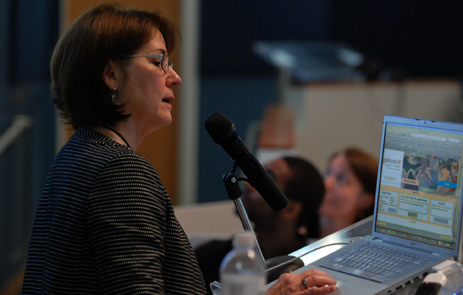
RJI news
Media tablets now used by at least one-third of U.S. adults
2013 RJI Mobile Media Research Report 2 In the three years since Steve Jobs introduced the Apple iPad, at least one-third of U.S. adults has acquired media tablets, according to the results of our 2013 survey. The original large-format media tablets remain the most popular, but the new smartphones with larger displays and less-expensive mini … Continued
News consumption on mobile devices surpasses desktop computers, newspapers
A 2013 mobile news consumption survey indicated the most dramatic increase of mobile media users were over the age of 45. “I was most surprised by the rapid adoption of mobile media devices and their use for news in the past 12 months by people age 45 and older, especially among those who have been … Continued
News consumption on mobile media surpassing desktop computers and newspapers
2013 RJI Mobile Media Research Report 1 Nearly 80 percent of all respondents to our 2013 Q1 phone survey said that they had used at least one Internet-enabled mobile media device in the seven days prior to taking the survey. That represents a 13-percentage-point increase since last year when our survey found that two-thirds (67%) … Continued
Is covering climate change going to be ultimate test of the value of journalism?
Journalist/activist (he says he is both) Bill McKibben made some important points last week as he accepted the Estlow Anvil of Freedom Award from the University of Denver in an event which RJI helped convene. He argues that that journalists have a responsibility to cover what’s significant, and that just because they have a point … Continued
RJI produces e-book to help fight plagiarism and fabrication
The American Copy Editors Society (ACES) will introduce a provocative new e-book produced at the RJI during the organization’s annual conference on April 4-6 in St. Louis. The e-book, titled “Telling the Truth and Nothing But”, addresses one of the most vexing issues confronting journalism today — plagiarism and fabrication. At the end of 2012, … Continued
Underserved health beat leads fellow to create niche news network
When traditional news organizations begin laying off beat reporters, crucial community coverage can take a hit. Health is one beat that is underserved in almost every community. People want to understand why so much money is spent on healthcare every year and why there are so many health problems in communities, said Jane Stevens, ACESTooHigh.com … Continued
2012: What we know now on building public trust, raising money and a free press
Was 2012 prosperous for publishers? The four-part series continues, with this third installment offering key lessons from three well-respected practitioners known for thinking outside the box. Mike Fancher, veteran news business strategist and 2008–2009 Reynolds Fellow; Lila LaHood, director of operations and development at San Francisco Public Press; and Keith Hammonds, director of Ashoka’s Knowledge … Continued
RJI receives $30.1 million endowment gift from Reynolds Foundation
COLUMBIA, Mo. — The University of Missouri announced Thursday that it has received a $30.1 million gift to guarantee permanent funding for the Donald W. Reynolds Journalism Institute, the 4-year-old center devoted to innovation, collaboration and research in media industries. The gift, the largest endowment gift in the history of the university, came from the … Continued
Dean Mills’ remarks at announcement of $30.1 million gift from Reynolds Foundation
Good morning. A transformational gift does not arrive overnight. Nor does it come as the result of the work of one or two individuals. My task this morning is to thank some of the many people who made this day possible. In fact, as Roger Gafke says, the story of this gift began in the … Continued
In Twitter we trust: Can social media sway voters?
RJI Fellow Brian Houston interviewed on NPR’s Science Friday.








